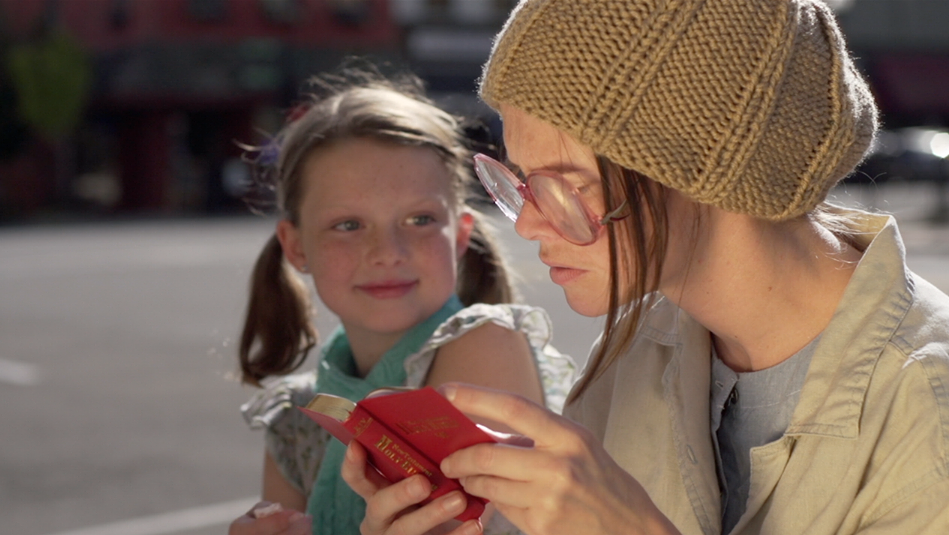Silent Sermon, by Reed Lackey
22 May
St. Francis is attributed with saying, “Preach the gospel always, and if necessary, use words.” Taking this maxim to a literal conclusion is a new film by Sharon Wilharm called The Good Book, which professes to be the world’s first evangelical silent feature film.
Upon hearing of the format, I was highly intrigued. Often, restrictions to a film’s budget or formatting can lead to creative choices that elevate the craftsmanship of the filmmaking. However, while I admire the efforts of this team and even commend them for some of their creative choices, The Good Book showed me that although there are filmmakers in the evangelical arena who are willing to take new creative steps forward, there are still several other fundamental steps left to be taken.
The premise of The Good Book is that there is a single, small printed Bible which through a series of loosely connected stories, finds its way into the hands of about a dozen people, many of whom will be changed forever as a result. The premise contains a tremendous amount of potential, some of which Wilharm taps into both with the script and with the direction. I could tell that the filmmakers were making concentrated attempts to deal with subjects that evangelical films haven’t touched on much such as domestic violence, marital infidelity, and even infant death.
Although the film is brave enough to tackle such subjects directly, it fails to say anything noteworthy about any of them except the single thing it says about all of them – namely that the Bible can be a source of inspiration in complicated times.
This central message, which I whole-heartedly agree with, is not explored so much as it is repeated. With each new scenario, the same basic formula is followed: the conflict presents itself, the Bible presents itself, a specific verse presents itself, and the conflict resolves. As formulas go, it’s simple enough to work well if executed effectively, but too often the Bible verses presented do not speak specifically enough to the conflicts presented to make the resolutions believable.
There are moments of real opportunity in the film to say something unique and profound – like when the blind-side-esque choir member helps a homeless lady get back on her feet through tremendous personal sacrifice, only to be rewarded by being mugged and finding out her husband has been cheating on her. This plotline is ripe with opportunity to confront the complexities of real life with the complexities of the scriptures, yet the film largely leaves that storyline unresolved.
Which brings me to my primary criticism of The Good Book – it does not lean enough on its main character.
If you’re going to craft a film about how the Bible impacts various scenarios, then allow more than just a half dozen verses, most of which speak the most basic of encouragements. I found myself hoping that the characters in these stories would display the variety of emotions I have often discovered in reading the Bible, which range from such positives as peace and hope to such challenges as anger and bewilderment. Some people in the movie engage the Bible in different ways, but if they engage it at all they tend to come away with a uniform sentiment of “happily ever after,” which is even true of the one character whose story happens to end with their own death.
The movie also doesn’t fully trust in its chosen format. It technically reveals its story with no dialogue (until the end where true life testimonials are given over the closing credits), but it still makes very overt gestures which often feel too obvious (like when a boy who feels guilty about committing a crime steps up to the police officer with arms outstretched in anticipation of handcuffs or when church members cruelly slide to the ends of their pews so as to keep a homeless lady from sitting next to them). A few of the actors give committed and believable performances, but the creative opportunities available in silent filmmaking feel sadly wasted on efforts to be sure that the audience never misses the point.
The existence of a film like The Good Book gives me hope that there are evangelical filmmakers out there who are willing to take risks, but it still seems to me that they remain unwilling to take the greatest risk: namely the risk of not being understood. What puzzles me most about this is that our chief example of creative storytelling took this risk all the time. Jesus said, “Therefore I speak to them in parables; because while seeing they do not see, and while hearing they do not hear, nor do they understand.” (Matthew 13:13 NASV) Sometimes you have to be brave enough not just to handle the taboo subjects in challenging ways, but to say something about those subjects which might not be grasped very well, even by those who agree with you.
Because the best films, like the best stories, are those which invite you into a relationship with them. They reveal a different facet of themselves with each new viewing, which causes them to resonate more effectively. The Good Book is a film about engaging the Bible with just such a relationship, but unfortunately it does not invite that same relationship with itself, which ultimately dilutes what it’s trying to say into something most of us have already heard before.




No comments yet